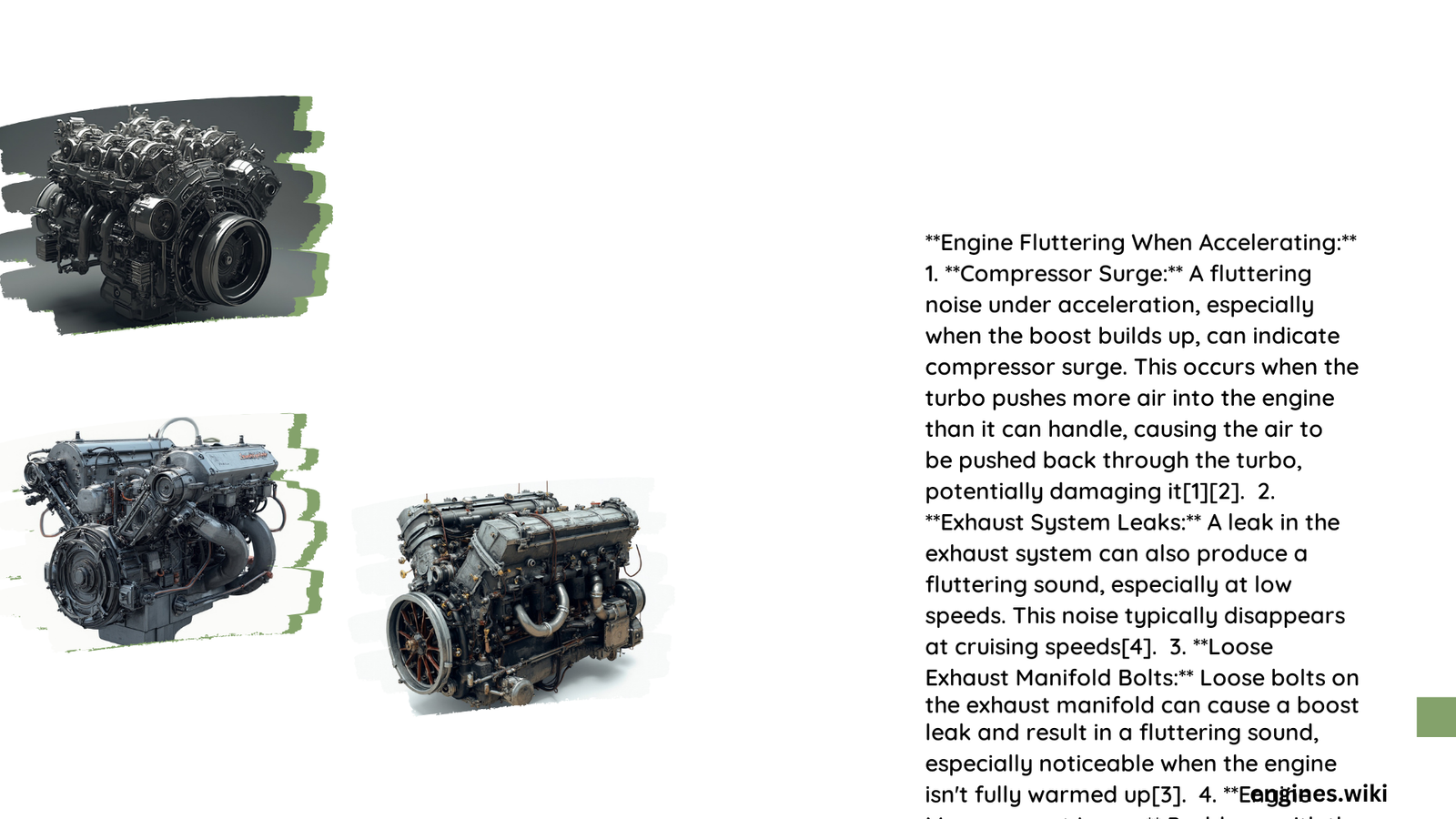Engine fluttering when accelerating is a common issue that can indicate various problems with your vehicle’s engine, fuel system, or ignition system. This phenomenon is characterized by a stuttering or hesitating sensation when you press the gas pedal, often accompanied by unusual noises or vibrations. Understanding the causes, recognizing the symptoms, and knowing the potential solutions can help you address this problem effectively and maintain your vehicle’s performance.
What Are the Main Causes of Engine Fluttering When Accelerating?
Engine fluttering during acceleration can stem from several sources, ranging from minor issues to more serious mechanical problems. Let’s explore the primary culprits:
Mechanical Failures
- Damaged Cylinders: Worn or damaged engine cylinders can lead to misfires and fluttering.
- Worn Accelerator Cable: In older vehicles with manual throttle control, a worn cable can cause throttle plate malfunctions.
Fuel Delivery Issues
- Bad Fuel Pump: A malfunctioning pump may fail to supply adequate fuel to the engine.
- Clogged Fuel Filter: Restricted fuel flow due to a clogged filter can cause stuttering.
- Damaged Fuel Lines: Compromised fuel lines can disrupt fuel delivery and pose a fire risk.
Ignition System Malfunctions
- Worn Out Spark Plugs: Old or dirty spark plugs can cause misfires and fluttering.
- Ignition Coil Problems: Faulty coils can prevent proper ignition, resulting in misfires.
How Can You Identify Engine Fluttering Symptoms?

Recognizing the symptoms of engine fluttering is crucial for timely diagnosis and repair. Here are key indicators to watch for:
RPM Ranges and Noise Characteristics
- Fluttering or stuttering at low speeds (15-30 mph)
- Noticeable vibrations or unusual noises during acceleration
Observable Performance Metrics
- Illuminated Check Engine Light
- Decreased performance, including hesitation or stalling when accelerating
Diagnostic Criteria
- OBD-II trouble codes related to fuel, ignition, or engine management systems
- Abnormal fuel trim and voltage readings
What Are Effective Solutions for Engine Fluttering When Accelerating?
Addressing engine fluttering often involves replacing faulty components. Here are some common solutions:
Spark Plug Replacement
- Remove spark plug wires and boots
- Use a spark plug socket to remove old plugs
- Install new spark plugs
- Replace wires and boots
Cost: $100-$300 for parts and labor
Fuel Pump Replacement
- Drain fuel tank or disconnect fuel line
- Remove old fuel pump
- Install new pump
- Reconnect fuel line or refill tank
Cost: $145-$1,300 for parts and labor
Ignition Coil Replacement
- Disconnect electrical connector
- Remove old coil
- Install new coil
- Reconnect electrical connector
Cost: $132-$588 for parts and labor
How Can You Diagnose Engine Fluttering Issues?
Proper diagnosis is key to effectively addressing engine fluttering. Here are some diagnostic techniques:
OBD-II Codes and Sensor Readings
- Use an OBD-II scanner to retrieve trouble codes
- Check fuel trims, voltage readings, and MAF sensor data
Testing Methodologies
- Visual Inspection: Check fuel lines, filter, and spark plug wires for damage
- Fuel Pressure Test: Ensure correct fuel pump pressure
Expected Timeframes and Costs
- Diagnostic Time: 30 minutes to several hours
- Diagnostic Cost: $94-$115
- Repair Time and Cost: Varies by issue (e.g., 1-2 hours for spark plugs, several hours for fuel pump)
What Preventive Measures Can Reduce Engine Fluttering?
To minimize the risk of engine fluttering, consider these preventive steps:
- Regular maintenance schedule adherence
- Timely replacement of wear items (spark plugs, fuel filter)
- Use of high-quality fuel
- Prompt attention to warning lights or unusual noises
When Should You Seek Professional Help for Engine Fluttering?
While some causes of engine fluttering can be addressed by DIY enthusiasts, certain situations warrant professional attention:
- Persistent Check Engine Light
- Lack of proper diagnostic tools
- Complex issues involving multiple systems
- Safety concerns (e.g., fuel system repairs)
By understanding the causes, symptoms, and solutions for engine fluttering when accelerating, you can better maintain your vehicle’s performance and make informed decisions about repairs. Remember, timely attention to these issues can prevent more serious and costly problems down the road.
References:
1. YourMechanic: Fluttering and bogging out when accelerating
2. BEMAC: 9 Reasons My Car Is Jerking Or Stuttering When Accelerating
3. MR2 SpyderChat: New \”fluttering\” sound at low speeds
